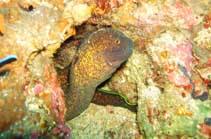| Family: |
Muraenidae (Moray eels), subfamily: Muraeninae |
| Max. size: |
240 cm TL (male/unsexed) |
| Environment: |
reef-associated; marine; depth range 0 - 150 m |
| Distribution: |
Indo-Pacific: Red Sea and South Africa (Ref. 3257) eastward to the Tuamoto and Austral islands, north to the Ryukyu and Hawaiian islands, south to New Caledonia. Eastern Pacific: Costa Rica, Panama and the Galapagos (Ref. 9324). Southeast Atlantic: South Africa. |
| Diagnosis: |
Dorsal spines (total): 0-0; Dorsal soft rays (total): 0-0; Anal spines: 0-0; Anal soft rays: 0-0; Vertebrae: 132-140. Reddish eyes (Ref. 1602). Color yellowish, densely mottled with dark brown; front of head purplish grey; posterior margins of fins yellow-green; gill opening in a black blotch. Juveniles sometimes bright yellow with brown blotches (Ref. 48635).
Description: Characterized by body depth at gill opening 11-20 in TL; origin of dorsal fin anterior to gill opening; anus slightly anterior to middle of body; without elongate canines in jaws, largest in outer row at front of upper jaw with short inner row of 1-4 larger teeth (Ref. 90102). |
| Biology: |
Along drop-offs (Ref. 48635). Benthic (Ref. 58302). Occurs in coral or rocky areas of reef flats and protected shorelines to seaward reefs. Feeds on cephalopods (Ref. 30573), fishes, and crustaceans (Ref. 89972). Most often appears on the reef after a fish has been speared during daylight. The regularity and promptness of such appearances make it clear that G. flavimarginatus is especially sensitive to stimuli emanating from an injured or stressed fish (Ref. 13550). Eaten in some parts of the Indo-Pacific (Ref. 12484). Minimum depth reported taken from Ref. 128797. Solitary and curious, usually seen with head protruding (Ref 90102). |
| IUCN Red List Status: |
Least Concern (LC); Date assessed: 17 August 2011 Ref. (130435)
|
| Threat to humans: |
reports of ciguatera poisoning |
Source and more info: www.fishbase.org. For personal, classroom, and other internal use only. Not for publication.
